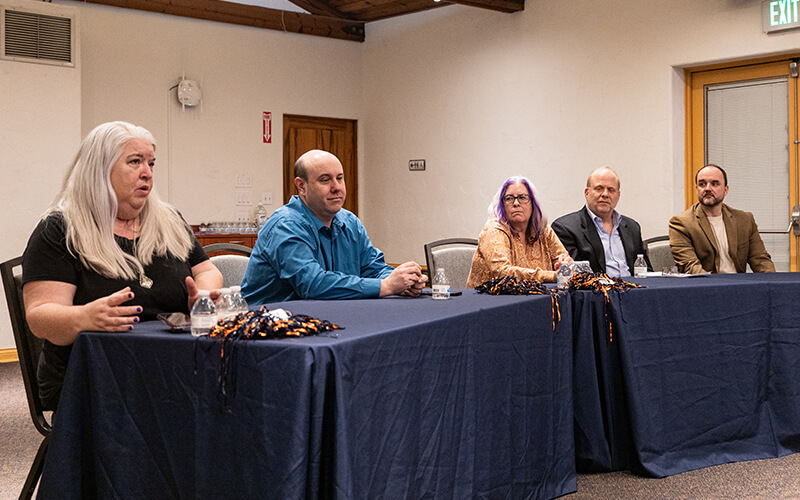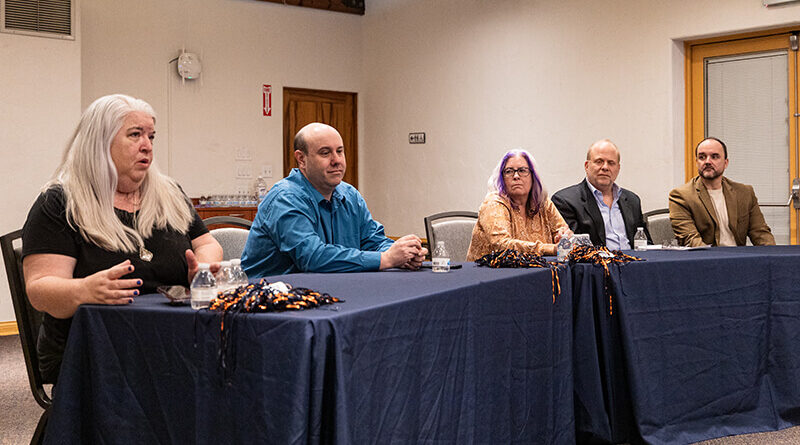Political Scientists Explain ‘What to Expect for 2024 Elections’

According to a group of political science experts, 18- to 34-year-olds are the largest voting bloc in California and could control the election — if they turn out.
Before the presidential election in Nov. 5, Cal State Fullerton’s Office of Alumni Engagement and the Division of Politics, Administration and Justice are encouraging voters to cast ballots or show up at the polls for Election Day. In California, where same-day registration is available, eligible voters have until 7:59 p.m. on Nov. 5.
During Nov. 1 “What to Expect for the 2024 Election” discussion at the Golleher Alumni House, political science faculty members from Cal State Fullerton and Fullerton College discussed what to look for on Election Night and in the coming days. The event was part of the Office of Alumni Engagement’s Go Vote education series.
After the polls are closed, what should voters be looking for?
Matt Jarvis, CSUF assistant professor of political science: The first poll closes in Kentucky at 6:30 pm Eastern time, which is 3:30 pm on the West Coast. And then you get nothing for a while. The first states to look at are Virginia, Florida and Ohio. If the Republicans don’t win Virginia’s 2nd District, it’s a bad night for the Republicans. If the Democrats don’t win the 7th District, it will be a bad night for the Democrats.
Donald Trump is expected to win Florida, but if it’s close or they don’t call Florida soon, that will be a sign that Kamala Harris is sleeping well. You’re also looking at the Senate race and the 13th and 27th Districts, all of which are expected to be Republican wins. If they don’t call soon, that’s a sign that the Republicans are not doing well. Trump is expected to win Ohio, but Districts 1, 9 and 13 are all expected to go Democratic. If any of them take too long to be called, you’re probably looking at a long night for Democrats.
Which stable state will give the first indication of the presidential result?
Rob Robinson, CSUF assistant professor of political science: Michigan. Both Wisconsin and Pennsylvania have statutes based on delay counting, and that was done in 2020 to set the scene for a Republican primary. Those states did not change those laws in those elections. But Michigan doesn’t have that kind of slow reading. Michigan is probably the best state for Harris on the blue wall,
Who will make this choice?
Shelly Arsneault, CSUF professor of social administration and political science: What I’m looking for in Florida is the availability of abortions and how many women are offering them. Young women are mobilized by reproductive rights and body autonomy questions, and now they are the youngest voters to be featured on TikTok in the Trump Access Hollywood tape. They are scared and they share it.
What impact do young voters, ages 18 to 34, have on this election?
Jodi Balma, Fullerton College political science professor: 18- to 34-year-olds in California and Orange County are the largest age group we have, so they can control the election. But they don’t stand out. In the 2022 and 2024 primary elections, 74% of all votes cast in Orange County and California were cast by those 50 and older. Decisions made may not be what young people want.
Arsneault: What keeps young people, and Californians in general, from voting is the Electoral College and this idea that we don’t care about. For young people, everything is about the presidential election and they don’t always understand how important congressional races are and that this is where we can make a difference and where our vote can be. very important.
Jarvis: The implementation of mail-in ballots and automated registration during COVID has really changed the voting game. We can’t make very good predictions about the outcome of the election because we only had one race in 2020 with these voting methods. I don’t think we’ll have a phone call on Election Night, even if they could in theory. I think they will be shy and protect it because of all these changes.
What can people expect to see in the days, weeks and months following the election?
Jarvis: I expect an increase in low levels of political violence. There will be stories on Election Day, some fake and some true, of people who were subjected to violence. If Trump wins, or if it looks like Trump is winning in early November, you’re likely to see massive protests in many major cities. I think they will continue until Inauguration Day. If Harris wins, violence is likely to rise.
Scott Spitzer, CSUF political science professor: As a political scientist, I am deeply concerned about the health of our democracy. It seems to me that the election process itself is under a cloud of fear that has engulfed the entire country—however, we are still having elections. I think there is still an opportunity for those of you who are able to vote, and have not exercised that option, to make a difference. So please vote.
#Political #Scientists #Explain #Expect #Elections
